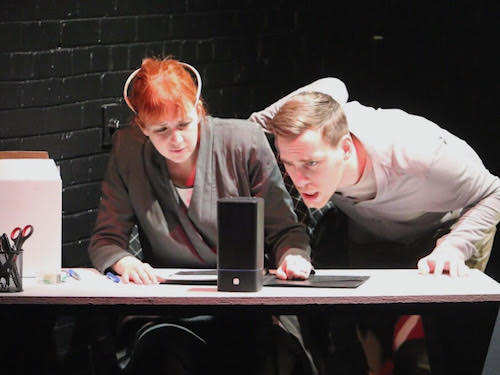 Girl in the Machine is a dystopian exploration of the not so distant future
Girl in the Machine is a dystopian exploration of the not so distant future
Girl in the Machine, Olivier Award-winning playwright Stef Smith’s 2017 one-act, has garnered a lot of comparisons to Black Mirror in its vision of a technological dystopia. Set in the not-too-distant future, it uses a fictional technology to explore our current technological addictions and their impact on our relationships with the here and now. This production, by Seven Siblings Theatre, is a hip, thoughtful, and discomfiting show from a promising young company. Just like in any new technical release, however, there are some bugs to work out.
Polly (Madryn McCabe), a workaholic successful corporate lawyer, is married to Owen (Alex Clay), a more humanistic nurse. As she updates her “citizen chip” with her new promotion, he gives her a present from work, the “Black Box,” meant to meld with one’s brainwaves via headset to reduce anxiety. Unlike many gadgets, this box actually seems to work – but then it works too well, triggering a mounting societal crisis.
With its accessible premise, Smith’s script has a lot of intriguing things to say about addiction and our mutually-present, conflicting desires for more work and for more ease. She gives us a world of despair, as well as of hope and resistance. The script sometimes appears to have a very clear message and moral stance, and sometimes feels more ambiguous.
This shifting clarity and ambiguity caused me some consternation where the character of Owen was concerned. Pro-humanity and anti-tech, he seemed to be written to appear the more sympathetic character, loving and understandably frustrated, particularly as Polly’s behavior gets more insular and strange. While this was partially the impression I received, his character also managed to ring numerous alarm bells in a way that I’m not sure was purposeful.
He whines about his wife’s corporate success over his own position, pressures her to use Black Box, and quickly becomes jealous of her use of it. He melts down in anger when she, in the throes of depression, is unenthusiastic about trying for children while the bodies are piling up outside and society threatens to collapse. In a way, he’s as detached from reality as Polly, but I wasn’t sure if the production itself was acknowledging that. I couldn’t tell if his actions were meant to come off as gaslighting or as correct, leaving me feeling unsettled.
This feeling might have been mitigated had the play spent more time establishing the positives or backstory of the relationship between Owen and Polly, or if the actors had exceptional chemistry with each other, so that we felt the loss of their bond more keenly. Instead, since both the script and the actors were so adept at portraying their breakdown and alienation from each other, it became a mystery as to what drew them together in the first place.
The dialogue is fast-paced, and the show could have picked up on that even more with more rapid transitions between scenes, furthering the urgency and leading to a more “shattered” feel. However, that would have robbed us of some of director Will King’s more effective transitions, such as Polly bonelessly sliding off a couch to the floor for the next scene, the picture of defeat.
The actors are still fully growing into the longer stretches of heightened, more philosophical dialogue that are punctuated by moments of jagged and emotionally-raw monologue. Since the dialogue requires a specific cadence, it can occasionally come off as stilted when it doesn’t settle perfectly. On the other hand, when emotions peak or deaden entirely, the actors are comfortably in their element, and the delivery suddenly feels spot-on.
Polly’s breakdown is effective and wrenching. The way she holds her body in the later stages of the play is angular and off-kilter, as if her torso were bending in a place it was never meant to bend. This physical choice helps to capture the unease and “wrongness” her character feels. Whatever my reservations with Owen’s character were, you can clearly see Clay’s anguish as the hold he had on the life he wanted slips away.
Contributing to the increasing feeling of claustrophobia, the Passe Muraille backstage space features an effectively cramped, shabby-chic apartment set by Stephen King, largely closed to the world outside and loomed over by an ominously coffin-shaped wall divider. Director Will King’s sound design is both catchy and creepy, and Sappho Hansen Smythe’s voicing of the Black Box hits the right note between Siri and HAL 9000.
Smith’s piece feels timely and urgent, even if it is more adept at showing us the world in pieces than the world worth fighting for.
Details:
- Girl in the Machine plays at the Theatre Passe Muraille Backspace (16 Ryerson Ave) until November 24, 2019.
- Shows run Wednesday-Saturday at 7:30PM and Saturday-Sunday at 2:00PM.
- Tickets are $20-30 and can be purchased online, by calling 416-504-7529 or at the Theatre Box Office, with PWYC Sundays at the door.
- Run Time: Approximately 75 minutes without intermission.
Photo of Madryn McCabe and Alex Clay by Stephen King
